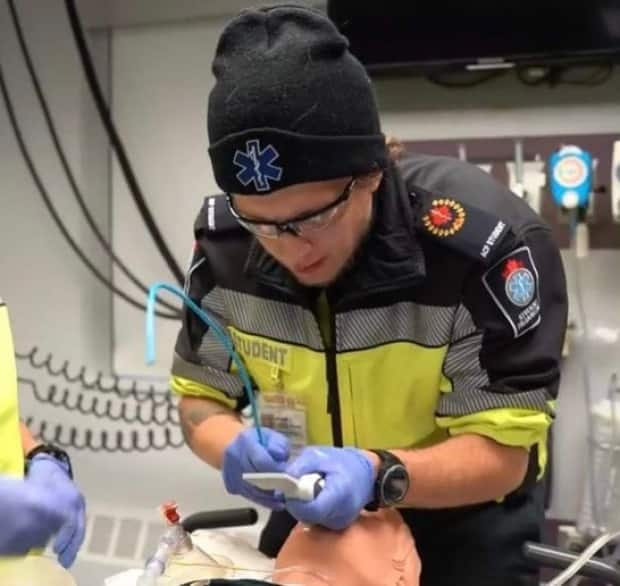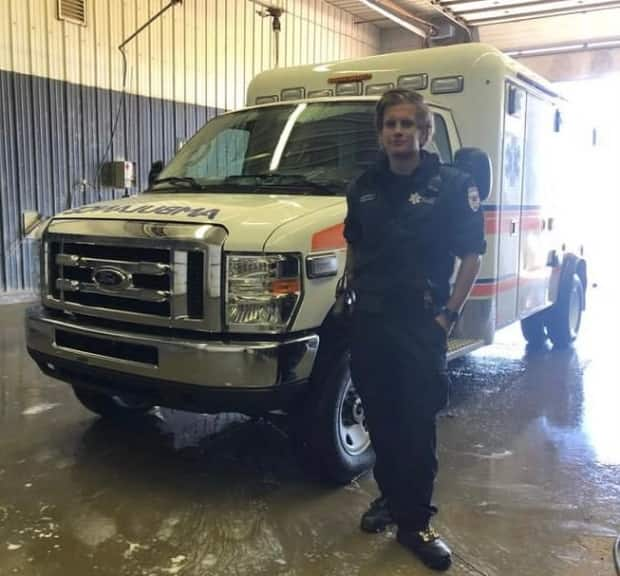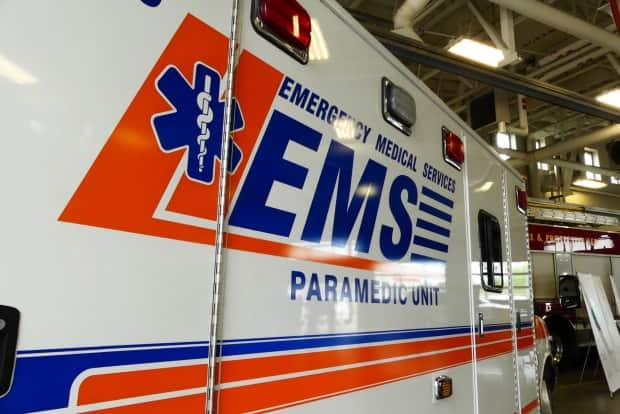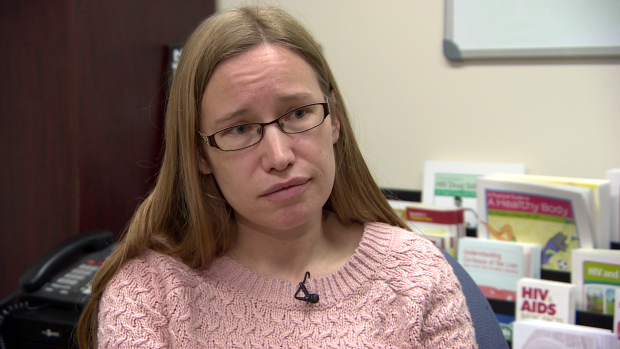Sask. paramedic on psychological injury leave warns of mental health impact of strained system

When Samuel Colin was a teenager, his father's alcoholism became so serious that Colin wanted to have the proper medical training in case the worst happened.
Colin trained to be a paramedic at 19. Today, at 25, he is an advanced care paramedic based in Regina.
The job has become more difficult than he ever could have imagined back when he was simply a concerned teenaged son.
Saskatchewan is facing a provincewide shortage of ambulances, as well as long wait times for EMS responses, according to the province's largest health-care union.
The Saskatchewan Health Authority (SHA) told CBC in an emailed statement in late October that both it and Saskatchewan's Ministry of Health are aware that there are times where call volumes may exceed anticipated and planned-for staffing levels.
Colin paints a more troublesome picture.
"When I first got into EMS, we were maybe doing a couple of calls a day and it would be things like chest pain or shortness of breath or a broken leg or something like that. But as the pandemic kind of started to slide in at first, what I noticed was we were seeing a huge increase in overdoses," said Colin.

Early in the pandemic, Saskatchewan was seeing a lot of people injured by fentanyl and other drugs. As people were forced into isolation, away from family and friends, many with addiction issues struggled.
But the increase in EMS calls went beyond addiction.
Colin says Saskatchewan's doctor and psychiatrist shortage has led people to not bother with long walk-in clinic wait times. Instead, they wait until their illness becomes acute and end up needing an ambulance.
Colin says matters worsened from winter 2021 to summer 2022, as ERs continued to overflow and EMS sometimes fielded more than 100 calls a day.
"For quite a while we were actually using the EMS garages for patients to basically be in there on beds, because there was no room in the waiting room, there's no room in the hallway, there's no beds available," Colin said.

Admission to ERs is based on acuity, so Colin spent many hours in EMS garages, topping off patients' medications and just simply waiting while ambulances stayed motionless and calls racked up.
"For myself and for a lot of other paramedics, we kind of felt like our abilities and our skills and the things that we went to school to train for ... we're not necessarily getting to do all the time because we're sitting in offload," said Colin.
"It's been kind of a downward spiral in terms of how busy we're getting versus how many paramedics are burning out or going off on injury or leaving the profession completely."
For quite a while we were actually using the EMS garages for patients to be in there on beds.… - Samuel Colin
Crashing and burning
Colin has been on an acute psychological injury leave through the Saskatchewan Workers' Compensation Board since September. This followed an EMS call to a rural house fire, which pushed Colin over the edge.
Colin says that over the years, as the job got more and more demanding, he has experienced worsening symptoms of his bipolar disorder, struggles with alcoholism, diagnosed PTSD and thoughts of suicide.
"My personal life melded with my career and the things that I was seeing had become so bad that I was suffering from huge addiction issues," Colin said.
"I would go out to work at a rural service for five days and I would come home … I would drink. I would do everything that I could to erase anything and everything that I had ever seen at that job."
Eventually, the drinking got so serious that in February 2021, Colin had to be taken to the hospital.
"I was on death's doorstep basically. I could go five days without leaving my bedroom because the bipolar was so bad," said Colin, who has been sober since February 2021.
I would do everything that I could to erase anything and everything that I had ever seen at that job. - Samuel Colin
Colin would go without sleeping for three to four days at a time.
"It ruined my life."
He says he was fortunate to be surrounded by people who supported him, including his father, who is also now focused on sobriety.

Concern for colleagues
Colin says he is most concerned about his fellow paramedics who may also be suffering from the rising pressures of the job.
First responders from all fields are twice as likely to experience post-traumatic stress disorder than other Canadians, according to the Centre for Suicide Prevention. The suicide rate among paramedics, according to Statistics Canada, is five times higher than the national average of 11.3 deaths per 100,000 people.
Colin says that after all he's been through, he doesn't regret becoming a paramedic.
"There's nothing that I would rather do."
But he wishes he had known what warning signs to look out for.
"I don't think that people that get into this profession are doomed to have the same issues that I did. But I think that it takes a lot more mental work than we realize."

Colin says many paramedics are scared of judgment, of people misunderstanding their mental health issues and of doctors misdiagnosing them.
"So they just don't get the help and they don't find the resources and they continue to self-destruct."
Colin wants paramedic training to include the warning signs of mental health disorders the job can cause. He says he was never informed, and therefore didn't know what to do when these issues surfaced.
Helping is coping: psychiatrist
Dr. Sara Dungavell, a Saskatoon-based psychiatrist, says paramedics cope with the traumatic job because helping patients motivates them.
"If you're picturing the worst day of your life, these are the people who live that every single day. They see some of the most horrible things that can happen in our world and they try to make it better," Dungavell said.
"That feeling of agency, and control, and an ability to actually do something to make this very distressing world a better place, is one of the protective factors or the coping factors for being able to constantly be seeing these really distressing things."
Dungavell says Saskatchewan's current health-care crisis is stripping away their ability to do that.
"Let's put them in the middle of an ER where they're hearing people in distress. They're seeing all the people who aren't getting their needs met. We're inherently making them powerless."

Dungavell calls it an endless cycle where nobody — patient or paramedic — is being helped.
The psychiatrist says that even though Saskatchewan is in desperate need of health-care workers, those who are already doing the work must be protected.
"If we don't take care of ourselves, then we can't take care of other people, said Dungavell.
"We have to actually make some demands on the system to hire more people, to give us more space. And we have to set very firm limits, even if it means that shifts go uncovered sometimes."
We're inherently making them powerless. - Sara Dungavell
Resources for EMS
In an emailed statement to CBC in early November, Saskatchewan's Ministry of Health said it empathizes with the situations EMS workers face on a daily basis.
Since 2019, the province has provided funding through the SHA to develop a mental health program, including peer supports, to support both public and contracted operators within the province.
Also in 2019, the Workers' Compensation Board established the psychological injuries unit to provide specialized support, compensation and medical treatment to workers. Colin is on this type of leave now.
The province is in the middle of a large recruitment effort to bring in health-care workers. The Ministry of Health also says work is underway to develop a provincewide approach to safe coverage levels for emergency and acute inpatient care, and EMS.

Colin says many paramedics aren't aware of the available resources. He says an awareness campaign would go a long way. He also wants to see support resources for friends and families of paramedics, who have to watch their loved ones deal with the pressure and trauma of the job.
Colin says he is looking forward to returning to work after the "necessary mental maintenance" that he and all paramedics need time to do.
For now, he writes, cooks and takes care of his pets. Anything to calm his mind.
If you or someone you know is struggling, here's where to get help:


